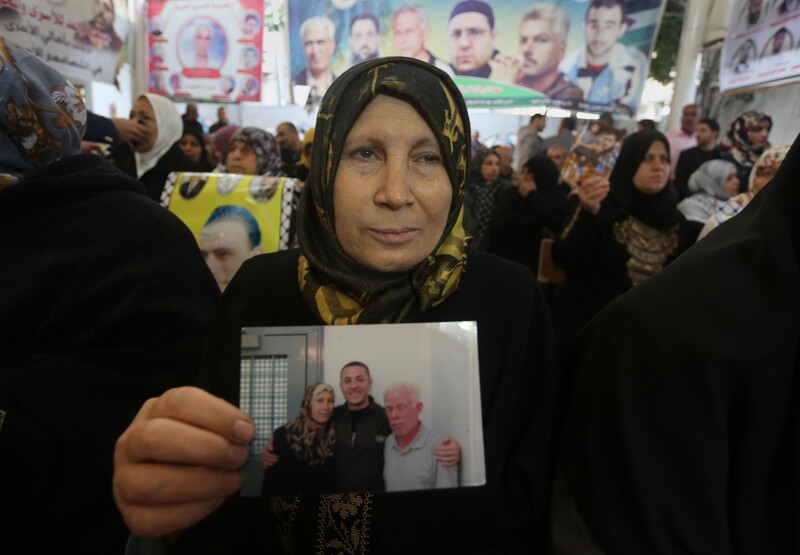Rights and Accountability
2 April 2016

Palestinians take part in a protest demanding the release of prisoners in Israeli jails, in front of Red Cross office in Gaza City, on 28 March.
APA images
A growing portion of the Palestinian prisoners held in solitary confinement by Israel have gone on hunger strike to protest their mistreatment.
And a new report reveals the ways Israeli doctors are helping carry out abuses amounting to torture.
As of last Wednesday, three Palestinians serving lengthy prison terms were refusing meals.
Nahar Saadi and Isam Ahmad Zein al-Din are protesting being held in solitary confinement for three and two years respectively.
Abdullah al-Mughrabi, who announced his hunger strike this week, has been held in isolation since February.
Al-Mughrabi was transferred to a solitary confinement cell after he was scheduled to be released.
In addition, Sami Janazrah, Imad al-Batran, Abd al-Rahim Sawayfeh and Abdul Ghani Safadi are on hunger strike to protest being held without charge or trial in accordance with Israel’s widespread use of administrative detention, a holdover from British colonial rule.
Forty-three-year old Janazrah, arrested on 15 November 2015, stopped eating on 3 March.
That month Israeli authorities extended his administrative detention order for an additional four months. These orders can be renewed indefinitely in periods of up to six months.
Sawayfeh announced his hunger strike on 24 March. He had previously spent 11 years in prison and was released in 2011 as part of that year’s prisoner exchange between Israel and Hamas.
He was arrested six months ago and, like 670 other administrative detainees, has not been charged with any crime.
According to Al-Quds newspaper, last week Sawayfeh refused an offer by Israel to deport him to Jordan.
His family reports that he suffers from more than one chronic illness that they fear will be compounded by his hunger strike.
Solitary confinement
Over the last two years, Israel has doubled its use of solitary confinement for all of its prisoners, both criminal and political, according to a new report from Physicians for Human Rights–Israel (PHRI).
While the total number of Palestinians currently in isolation is reportedly 14, that figure does not represent the uncounted number of Palestinian detainees who are placed in solitary confinement during their interrogation or for “punitive” reasons.
“Solitary confinement is chosen for the duration of interrogations precisely because
of its devastating psychological effects on individuals,” the report states.
In 2009, the United Nations Committee against Torture found that Israel used isolation against Palestinians to “encourage confessions from minors,” as well as to punish violations of prison rules.
PHRI writes that Israel’s secret police agency, the Shin Bet, places Palestinians in solitary confinement on the grounds of “protecting state security,” often based on secret information that a prisoner cannot appeal.
In 2012, following a mass hunger strike, the Israel Prison Service agreed to release Palestinians placed in isolation by the Shin Bet. PHRI believes this supports the view that that these placements are arbitrary.
“The real reason behind it was punishment and vengeance,” the report states.
Collusion of Israeli medical professionals
PHRI finds that Israeli healthcare professionals give solitary confinement “a medical stamp of approval” despite the World Medical Association Declaration of Tokyo prohibiting physicians from taking part in any way in torture or cruel punishment.
In 2011, the UN Special Rapporteur on Torture, Juan Méndez, argued that solitary confinement for more than 15 days constitutes torture and can result in permanent psychological damage.
PHRI reviewed prisoner medical files and found that prison health providers will explicitly state whether a prisoner is “fit for solitary confinement” or “there is nothing to prevent solitary confinement in this case.”
Medical professionals also visit prisoners held in solitary confinement.
But in spite of the involvement of medical professionals in the process of confining prisoners to isolation cells, Israel’s health ministry and the Israel Prison Service do not consider the practice a “medical matter,” thereby relieving the medical establishment of any responsibility to intervene.
Last year, PHRI wrote a letter to the health ministry outlining its concerns over prisoners held in solitary confinement. In response, the ministry wrote, “From the medical perspective, we see no justification for your complaint.”
An update to the World Medical Association’s Declaration of Tokyo in 2007, which the Israeli Medical Association approved, obliges physicians to report any instance of torture they witness.
The Israeli Medical Association claims that the physicians working for the prisons are not its members. In a position paper, the IMA established that physicians should not sanction solitary confinement because “prolonged solitary confinement might have have negative effects on the physical and mental health of the prisoner.”
However, the IMA says that physicians are only obliged to intervene to end the torture if they are able to “identify some concrete risk to the prisoner’s health.”
“This approach fundamentally contradicts the ethical obligations falling to physicians,” PHRI writes, stating their duty compels them “to prevent damages to their patients and not just stop it after it occurred.”
Tags
Source Article from https://electronicintifada.net/blogs/charlotte-silver/israeli-doctors-assist-torture-palestinian-prisoners
Related posts:
Views: 0
 RSS Feed
RSS Feed
















 April 4th, 2016
April 4th, 2016  Awake Goy
Awake Goy 
 Posted in
Posted in  Tags:
Tags: 

















Add new comment